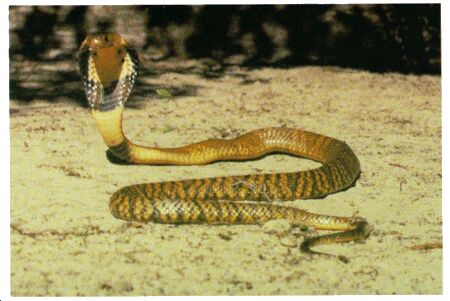 |
 |
 |
 |
| APPENDIX E |

Description: Also known as the Asiatic cobra. Usually slate gray to brown overall. The back of the hood may or may not have a pattern.
Characteristics: A very common species responsible for many deaths each year. When aroused or threatened, the cobra will lift its head off the ground and spread its hood, making it more menacing. Its venom is highly neurotoxic, causing respiratory paralysis with some tissue damage. The cobra would rather retreat if possible, but if escape is shut off, it will be a dangerous creature to deal with.
Habitat: Found in any habitat cultivated farms, swamps, open fields, and human dwelling where it searches for rodents.
Length: Average 1.2 meters, maximum 2.1 meters.
Distribution: All of Asia.

Description: Yellowish, dark brown, or black uniform top with brown crossbands. Its head is sometimes black.
Characteristics: It is extremely dangerous. It is responsible for many human deaths. Once aroused or threatened, it will attack and continue the attack until it feels an escape is possible. Its venom is neurotoxic and much stronger than the common cobra. Its venom causes paralysis and death due to respiratory failure.
Habitat: Cultivated farmlands, open fields, and arid countrysides. It is often seen around homes searching for rodents.
Length: Average 1.5 meters, maximum 2.5 meters.
Distribution: Africa, Iraq, Syria, and Saudi Arabia.
| Updated: 12 January 2008 |
|
Born on 29 January 2000 |